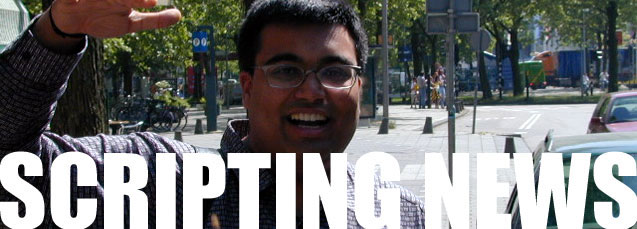
|
|||||||||||||||||||||||||||||||||||||||||||||||||||||||
A new chapter in my dad's MBA Toolbox. "Once you start looking for business opportunities, you are more likely to find them."
I cross-posted on the Really Simple Syndication site, it'll be interesting to see if Memeorandum picks it up. Like Scoble, I find it's changed the way I think about blogging. Not many of these tech gadgets do that. PaidContent interviews Martin Nisenholtz of the NY Times. BusinessWeek profiles anonymous blogger Mini-Microsoft. Bret Fausett: ICANN Adopts RSS...and Podcasts! Once upon a time there was a fictitious continent named Postelia, and it had a wonderful network of trains. You could go anywhere you liked, every town had a station, and there were subways too, every neighborhood had a stop, and you could get from the main rail line to one of the sub-lines, and through a complicated set of "peering arrangements" your pass on one line would gain you entrance to the other. It was very convenient to get around in Postelia, and inexpensive too. While America, Europe and Asia were choking under clouds of gasoline exhaust, the skies of Postelia were clear. Birds sang, children played and life was good! To make the system even more terrific, there were conventions. If you went into a station you'd find that there was a pattern. The low numbered tracks were for inter-city express trains, the high-numbered ones were for tourists and students and went to resorts or places of historic interest. The odd-numbered tracks went north or east, the even-numbered ones went south or west. There were hot dog stands on tracks whose numbers were divisible by five, and news stands on tracks whose numbers were divisible by 12. And at every station, on Track 24, there was a Traveler's Aid station. That meant that if a Postelian lost his wallet while traveling, or got tired and needed a place to sit down, they could go to Track 24, where they would find someone with a helpful attitude and a hot cup of coffee. Some tourists knew about the Track 24 convention, and those that didn't could find the information in one of the many tour guides. Or they would learn about it if they asked someone on the train where to go for help, or if they stopped a friendly policeman, or asked a vendor at a hot dog stand. Most people didn't know about the Track 24 convention, but the people who helped people, did. The information wasn't known by many people, but it was widely available. A subtle difference. And that concludes our story for today.
|
|
||||||||||||||||||||||||||||||||||||||||||||||||||||||
|
© Copyright 1997-2005 Dave Winer. The picture at the top of the page may change from time to time. Previous graphics are archived. Previous/Next |
|||||||||||||||||||||||||||||||||||||||||||||||||||||||



